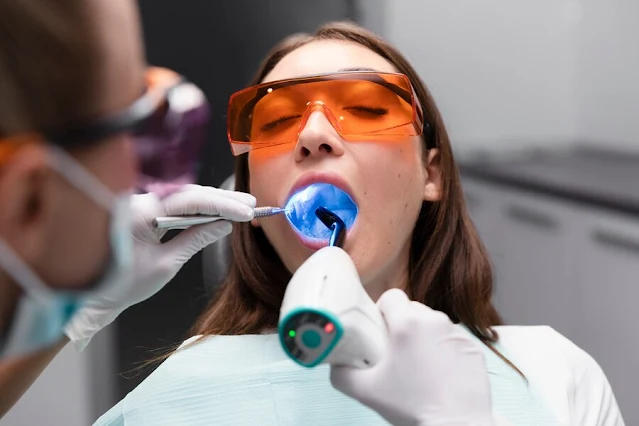 |
| Image by freepik |
In fact, it was observed during the study that 30 percent of 2,000 participants experienced increased teeth grinding and facial pain as a result of stress caused by the pandemic. Constant grinding puts pressure on your jaw and mouth, which can cause long-term problems like earaches, jaw deformities, and chipped teeth. The obvious symptoms of teeth grinding are neck or jaw pain the next morning. Although teeth grinding is a common problem, there are several teeth grinding home remedies that can treat the grinding itself and are the main reasons for relieving stress and getting a better night's sleep.
1. Splint therapy
Splint therapy is an effective measure to reduce nighttime teeth grinding. This includes wearing a custom night guard, bite guard, or occlusal splint. The guard will act as a barrier between your upper and lower teeth to prevent you from grinding at night. While you can buy one at the drugstore, it's best to visit your dentist to get one fitted to your exact bite because an ill-fitting splint can actually increase grinding behavior.ALSO READ
The Training of Artificial Intelligence to Deceive Humans is Feasible
A recent study conducted in California by researchers from AI startup Anthropic has revealed disturbing findings about artificial .......
A recent study conducted in California by researchers from AI startup Anthropic has revealed disturbing findings about artificial .......
2. Warm compress
A warm compress is great for teeth grinding and clenching symptoms. The compress will help the blood circulation in the area to relax the muscles and reduce the pain. You can do this by laying your cheek against a heating pad or applying a warm washcloth to your cheek. Another option is to use a hot water bottle. They can be easily shaped to fit your jawline and temples.3. Jaw massage
Massaging overworked jaw muscles is another effective way to reduce the pain associated with teeth grinding. There are many ways you can use to massage your jaw and target specific muscles, but here are a few to get you started:- Open and close your jaw fully (repeat 10 times)
- Open your mouth and move your jaw from left to right (repeat 10 times)
- Using your fingers starting at the jawline below the ears and working your way down, gently massage in a circular motion wherever you feel knots or pain.
- 4. Conscious placement of teeth
- Becoming aware of how tight your jaw is is one way to avoid the clenching or grinding that can occur throughout the day. Try to be more aware of the space between your upper and lower teeth. Do this as much as possible during the day (except for chewing) to learn to position your jaw correctly.
4. Stress reduction techniques
Stress can manifest itself in different ways throughout the body. By implementing stress-relief techniques into your daily routine, incorporating cardiovascular exercise, and focusing on your overall health, you'll be able to better manage your stress and become more aware of your triggers. Here are some ways you can reduce stress in your daily life:- Keep writing the diary
- Meditation
- Spa
- Yoga
- Walk
5. Foods rich in magnesium
Magnesium is an alkaline mineral known to benefit heart and muscle health, and it can help relax muscle tissue and blood vessels. You can apply a topical magnesium lotion or spray to your jaw to ease the pain or try adding more magnesium-rich foods to your diet, such as almonds, pumpkin seeds, spinach, and cashews.ALSO READ
The Training of Artificial Intelligence to Deceive Humans is Feasible
A recent study conducted in California by researchers from AI startup Anthropic has revealed disturbing findings about artificial .......
A recent study conducted in California by researchers from AI startup Anthropic has revealed disturbing findings about artificial .......
6. Turmeric milk
Drinking milk before bed has been a popular nighttime ritual for decades, and adding turmeric can make it an even more effective nighttime drink. The amino acid tryptophan found in milk helps the nervous system to sleep peacefully and the curcumin found in turmeric acts as a natural anti-inflammatory. Be careful how often you eat turmeric, as it can stain your teeth over time.Turmeric milk (also known as golden milk) is made by heating milk of your choice and adding a little turmeric spice, a pinch of black pepper to aid absorption, cinnamon, and a sweetener of your choice (eg. honey) can be added. Let the ingredients simmer for 10 minutes and then enjoy.
7. Herbal tea
Drinking herbal teas such as chamomile tea is another easy way to relieve teeth-grinding pain. Herbal tea relaxes the body and mind for a better night's sleep. Try drinking a cup of warm herbal tea before bed to reduce the chances of grinding during sleep.8. Vitamin C
Vitamin C has a wide range of health benefits, including immune-boosting properties. It can also benefit the adrenal glands which help to keep stress at bay. Vitamin C can be found in many fruits and vegetables, such as citrus fruits, peppers, strawberries, blackcurrants, and broccoli. You can also talk to your doctor about adding vitamin C supplements to your diet.ALSO READ
The Training of Artificial Intelligence to Deceive Humans is Feasible
A recent study conducted in California by researchers from AI startup Anthropic has revealed disturbing findings about artificial .......
A recent study conducted in California by researchers from AI startup Anthropic has revealed disturbing findings about artificial .......
9. Valerian root
Valerian is an herb and a popular ingredient in many medications that help relieve insomnia, restlessness, and anxiety. You can take valerian tablets 30 to two hours before bed or soak dried valerian root in a cup of warm water to try to help you sleep and reduce stress.10. What causes teeth grinding at night?
Teeth grinding is a common problem that is usually caused by underlying stress or anxiety. Teeth grinding often occurs at night, but teeth clenching can occur during the day. In some cases, teeth grinding can be caused by sleep disorders such as insomnia.What are the Causes of side effects and Long-term effects of grinding?
Teeth grinding can cause a variety of side effects and long-term problems, some minor and some more serious.Side effects of teeth grinding include
- Fractured crown or filling
- Cracked or damaged teeth
- Loose or painful teeth
- Wear of tooth enamel.
- Pain in jaw, face, and ears.
- Headache
If you've been grinding your teeth for years, it can lead to more serious problems, such as difficulty swallowing, speaking, and chewing. Other problems that may arise include chronic ear pain headaches and facial muscle spasms.








